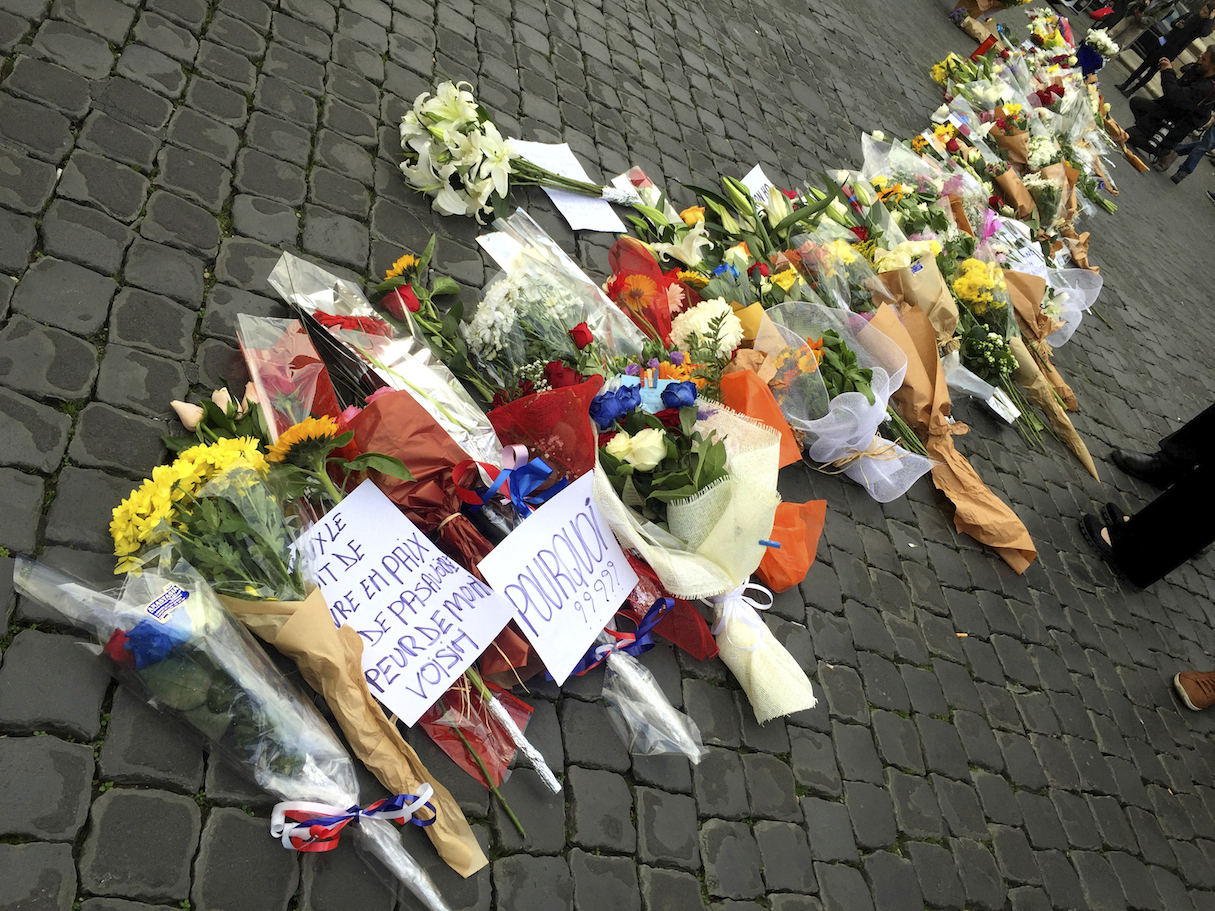A novel set in an anxious and divided Paris, and examining the unprecedented rise of a political party known as the Muslim Brotherhood: on one level, this is what Submission, the new novel by Michel Houellebecq, is about.
A sour-visaged depiction of the author, a critic (in interviews) of Islam, appeared on the cover of Charlie Hebdo the day of the retributive slaughter at the hands of vicious jihadists–the same day, coincidentally, Submission was published. For however long the novel survives in public discourse in France, it seems likely it will be shadowed by the terrible and unfortunate fact of these murders.
In America, the book, translated by Paris Review editor Lorin Stein, was just beginning to generate reviews when terrorism again intruded its demonic head into the conversation. It is probably inevitable that the recent heinous attacks in Paris by separatist Islamic crusaders will shadow the work for American readers, and prompt them to view it in the light, or, rather, the darkness of that tragedy.
This is too bad. The book they will read is not the book Houellebecq has written.
Of course, the book he has written is not the book that some have been reviewing.
There have been pieces calling Submission deeply misogynist (deeply misanthropic is more like it), pieces calling it a biting critique of contemporary French politics (sure, and Moby-Dick is about life on a ship; this view also conveniently ignores Houellebecq’s long reach into history), pieces labeling it a satire (at times, yes, okay). The lengthy and unusually thoughtful review by Karl Ove Knausgaard in the New York Times two weeks ago (one of the best book reviews you’ll ever read, by the way) comes nearest to penetrating the strange mystery of the book, and Knaussgaard rightly lingers on the word ambivalence in describing its essence.
The other word I would use is despair, a quality that seeped through much more on my second reading than it had on my first. A despair that permeates every page, every scene, every observation. If you haven’t read the book, you might conclude, from this, that the experience of turning the pages is grim and without pleasure, but in fact Submission is very funny, easily the funniest of the four Houellebecq books I’ve read. For a novel of ideas (it is this, too, perhaps this more than anything else), it is unexpectedly a quick, not dense, read. The humor does not lighten the despair; if anything it proves just how total, how extreme, that despair is.
The first paragraph situates us, with its sly (and funny) echo of the first paragraph of Camus’s The Stranger, another novel by a Frenchman that concerns itself with an encounter with the Arab Other.
Here is Camus: “Mother died today. Or, maybe, yesterday. The telegram from the Home says: Your mother passed away. Funeral tomorrow. Deep sympathy. Which leaves the matter doubtful; it could have been yesterday.”
And here is Houellebecq, whose anti-hero, Francois, begins his narrative with a reminiscence of his dissertation defense: “The next morning (or maybe that evening, I don’t remember: I spent the night of my defense alone and very drunk), I realized that part of my life, probably the best part, was behind me.”
Francois is a different sort of character from Meursault–he is much more immediate on the page, with his appreciation of kabobs, good cheeses, and anal sex–but both are passive figures in their own existence, seemingly without agency, even as they might be said to have embarked upon a search for meaning. There is nothing of the New Age seeker about Francois. He is not a contented man in pursuit of a higher state of consciousness. His search is born of despair. How am I to live? Why should I not just end my life now?
The Stranger has an open-endedness that invites us to read it as a philosophical meditation on the questions that animate and trouble Western culture and society–morality, freedom, conformity, revolution. Submission is more pointedly about French culture and society, and not simply the culture and society of today.
Early word about Submission was that Houellebecq had written a dystopian novel about France under Islamic rule, and the author’s previous remarks about Islam, along with his long history of provocation, only reinforced the impression that what we had, here, was a Satanic Verses for the age of ISIS. Submission is not that book. What its subversive author is actually up to is far more subtle, and more clever, than what might be gleaned from a book review or from word of mouth.
By “cleverness,” I don’t mean to suggest a writer with a look-at-me wit, or one whose characters speak in pithy aphorisms, as if they had been lifted intact from a Noel Coward production. Houellebecq’s cleverness is of a different order entirely, and is built into the deceptively complex structure of this apparently straightforward narrative
From one angle, this is the rough action of the novel: The year is 2022 and, as the restult of a coalition government formed by an alliance between the Muslim Brotherhood Party and the French socialist party, a smooth-talking moderate, Mohammed Ben Abbes, becomes President of France. The expected sweeping reforms are not sweeping. Women are given monetary inducements to stay at home with their children, and they begin to cover up more in public, but for the most part life proceeds as before. Meantime, Abbes begins plotting a strategy to entice the former colonies of the French republic to create a new, pan-Arabic coalition.
But action, in Submission, is not essence, and this fascinating thread of the narrative turns out to be a feint. Houellebecq is not terribly interested in what life looks and feels like in the wake of the takeover–Francois records the quotidian details with an odd detachment, almost a clinical disinterestedness, as if he were hovering on the margins of a grand gala, dashing off the occasional note to puncture his boredom. This passive acceptance of what, for many in Europe, right now, is a cataclysmic fear, the dawn of a terrifying new age, a kind of anti-Crusades, is among the book’s many provocations. Houellebecq uses the rise of the Muslim Brotherhood as a bookend, a glimpse of a possible future not too terribly far off. The other bookend is Francois’s extended rumination on the 19th century writer J.K. Huysmans, who is not simply the subject of Francois’s dissertation and the center of his academic existence, but also an ambivalent guide to the questions that preoccupy him.
Huysmans has received far less attention in reviews and articles about Submission than the narrative thread of the rise of Islamic rule, but his presence in the novel as a kind of hovering spirit is just as important as the more visceral, more immediate presence of Ben Abbes and his brethren. In the bookended design of the book, Houellebecq’s intentions are made clear. We have, here, three glimpses of France: France past, France future, and France present. Looking backward and forward, comparing and contrasting epochs, enables Houellebecq to analyze France present with greater depth and perception.
And what does he see? Francois has no real attachments. He belongs to no organizations, and has no affiliations. Returning from a trip to Rocamadour, in southwest France, he tells us that his mother has died; this information is delivered in a single, affectless paragraph, and immediately he is on to another, more presssing matter: the matter of his paycheck from the university. Sex is joyless and without emotion, an enactment, a compulsion. Women are overworked and competitive, and their company is anything but a comfort to him.
In this, Francois recalls the stunted, affectless narrators of other Houellebecq fictions, men who are inclined more to observe than to participate in life, and who don’t really ever feel. Here, though, we are made to see his spiritual ennui as more broadly representative than his forebears; the name invites us to see him as a stand-in for the nation. Flaubert proclaimed of Madame Bovary, Emma, c’est moi. Houellebecq has turned the formulation around: Francois, il est vous.
In those moments when Francois ventures out from his apartment and bothers to look beyond himself, the picture is hardly more appealing. He sees his friends, and wonders what enables them to get through the day, other than an interest in “regional cooking” and recreation. His mounting existential crisis recalled for me a favorite passage in Walker Percy’s Lost in the Cosmos: “Dazzled by the technological transformation of the very world itself, the self finds itself in the end disappointed by the failure of science and technique in those very sectors of life which had been its main source of ordinary satisfaction in past ages. … Recreation and good physical health appear to be the only ambivalent benefits of the technological revolution.”
So what sustains Francois? This is the question he himself comes to ask, not once, but again and again, most memorably, perhaps, when he writes of his sort-of girlfriend Miryam, who eventually flees Paris with her family for Israel: “I didn’t even want to fuck her, or maybe I kind of wanted to fuck her but I also kind of wanted to die, I couldn’t really tell.”
If Submission is an attack, it is not an attack on Islam; Houellebecq is more curious than caustic about what an Islamicized France might look like. The attack, such as it is–the tone never rises (or descends) to the level of polemic or panegyric, as if the author were painfully aware that to raise his voice in such a context, and with everyone watching, would only inflame the passions of the herd–is an attack on individualism, on liberal democracy, on enlightment and reason, ideas nurtured more than two centuries ago on this same French soil.
This is an unspeakably tense time in France; the headlines are depressing, and if the current crop of fiction is a reflection of the psyche of the nation, then the French are dreaming darkly of civil war. Nearly every week comes another op-ed ruminating on ISIS, on the growing Muslim presence, on the inevitable collapse not just of the government but of an entire way of life–of a sacred secular liberal civilization.
In Submission, Houellebecq is principally addressing the angst-ridden, and with a barely suppressed snicker: This? This is the society and culture we must defend against the coming barbarians? This empty faithless selfish France of Francois?
I’m disappointed that I haven’t read more about the book’s despair, and its pitiless examination of individualism, but I can’t say that I’m surprised. Houellebecq has laced his path with so many distractions for the contemporary, politically correct reader–the mere fact of a white Westerner attempting to write with authority about Islam, the offhand misogyny, the casual disdain for the humanism promulgated by the academy–that it’s almost easier to focus on these broad targets and call him out for his crimes against modernity than to take the time to examine what he’s doing.
The other complicating fact is that it’s hard, for many, to know what to make of an attack on an idea we in the West hold so dear as to not consider an idea at all. Individualism isn’t an -ism, it’s an is. Other than on the fringes of academia, we don’t question its worth, we don’t challenge its assumptions, we don’t hold it up for discussion or debate. It is colorless; it is the air we breathe. To look at it–simply to look at it, that and no more–is akin to asking why the sky is blue. And Houellebecq does more than look. More than question and challenge. This makes him an oddity, at best; at worst, an ungrateful bastard. Yeah, you think individualism is bad? You wouldn’t be able to publish your scathing books without the fruits of individualism. And so, rather than engagement with the substance of that inquiry, we get the labels. Provocateur. Bad boy. Crank.
All of which, yes, apply, just as they did in earlier works. But they cling to the surface; they don’t help us to penetrate to the substance of the work, where the author poses his most difficult questions.
In constructing his novel as a dual examination of Huysmans’s spiritual journey and the rise of the Muslim Brotherhood, Houellebecq gives himself room to ponder a possible antidote to the inevitable despair that comes of individualism: faith. Huysmans converted to Catholicism, and Francois flirts with doing the same, even going so far as to recreate, right down to the town and the abbey, the spiritual journey his muse set upon a century earlier. Huysmans had already made his reputation as a kind of poet of decadence. Did his conversion amount to a repudiation of his past? Or was this the culmination of a journey a la St. Augustine, one that led him along a rocky path from debauchery to salvation? Francois, even after re-reading the writer’s books, can’t decide.
In Submission’s pivotal scene, Francois takes a pilgrimage to the Black Virgin at Rocamdour to escape Paris, where violence has erupted in the aftermath of the announcement of a new government. Every day he sits in chapel in contemplation of the Black Virgin, “calm and timeless.” Huysmans, his hero, had embarked upon a similiar pilgrimage to Rocamdour, and was moved to convert to Catholicism, his soul borne aloft in a moment of religious ecstasy. There is no such transformation for Francois, though he does experience an epiphany. Staring in silence upon this totemic figure, his mind calm and open, leads him to an insight about the Romans (their society, he recalls, was more communal than individual) and with that an insight into the limitations of individual judgment and individualism itself. Unable to submit to God, trapped in the modern world of the self, Francois is stuck — profoundly, existentially stuck. It is a delicately wrenching passage.
Returning to Paris, he is just as ambivalent about the place for him in the new, Islamicized society, where faith is no longer a matter of choice, but synonymous with being a citizen in the society. The intense earnestness of the pilgrimage chapters and the reckoning with Huysmans gives way, here, to a kind of absurdist comedy. Francois mourns the loss of tight skirts and easy access to long, exposed legs. He laments the curtailing of freedoms–in particular, the way a professor rationalizes the teaching of Rimbaud’s conversion to Islam (once a matter of academic dispute, now regarded as fact). On the other hand, he marvels at the money flowing from the Saudis into the formerly penurious colleges where he and his colleagues have slogged away at their disciplines for years. And, not least–no, not least–the dangled carrot that is meant to lure him out of retirement: a salary three times as large as before, with three women provided for by the Islam-converted Dean Rediger (the best character in the book, combining the sinister string-pulling of Judge Holden in Blood Meridien with the matter-of-fact casualness of Lenny the pimp in Pinter’s “The Homecoming”).
To play the nation’s abrupt turn toward Islamicized rule as absurdist comedy, even, at times, as blithe, light farce, after so many of his critics and chroniclers had been anticipating a book of bitter denunciation: this is Houellebecq’s biggest provocation, a sustained piece of black humor. By the end, the tone of Submission combines a shrugging who-knows–could it really be so bad?–with a sly, wry cynicism–something, anything, to give us structure, to order our desolate days; something, anything, to make us want to rebel. When anything is possible, Houellebecq might say, nothing is. When freedom is easy, there is nothing, really, to cherish.
A novelist isn’t expected to furnish an answer. The role of the novelist is to pose questions, and to make us uncomfortable with both the posing and the questions themselves. Houellebecq doesn’t offer a plan. He offers a diagnosis of what, in his mind, is–the ills of individualism, the driftlessness of a society without faith and so without real order, the toothlessness of a freedom that everyone asserts and no one questions.
Does this make him a man of the right, as some in the left-dominated (and right-fearing) literary world think? Some have cast him as a critic of the 1960s, embittered by the excesses of that era. And Submission may be read as being of a piece with that worldview. But more interesting, to me, than the question of Houellebecq’s ideology is the fact that his views are perceived, by many, to stand outside those of the literary establishment. If novelists are not expected to furnish answers, neither should they be expected to be right. They are expected to be interesting.
One of the ways to be interesting is to flaunt the rules, to step outside the bounds of taste or propriety, as an entire generation of writers in the ‘50s and ‘60s, including Henry Miller, Anais Nin, William Burroughs, Jack Kerouac, Allen Ginsberg, and countless others, did. They saw through the contradictions of an open society that was really closed and the restrictions that that culture was determined to impose upon them. Is Houellebecq a mere reactionary to question what all this openness has wrought? And if it is exciting for a writer to challenge orthodoxy, does it matter who constitutes that orthodoxy?
I wouldn’t say he’s a lefty, but if he’s a righty, he’s a particular kind of righty–a righty of the long view: pessimistic about notions of progress, skeptical of easy answers, or of any answers, a man of measured despair whose immersion in history and literature has taught him that time can’t be measured in election cycles or decades, that technologies exist to distract us and/or give us new means to destroy ourselves, and that people never do change.
Today, in this age, that qualifies as real subversion.














